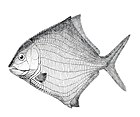Sinosaurichthys
 From Wikipedia the free encyclopedia
From Wikipedia the free encyclopedia
| Sinosaurichthys Temporal range: | |
|---|---|
 | |
| Sinosaurichthys longimedialis fossil | |
| Scientific classification | |
| Domain: | Eukaryota |
| Kingdom: | Animalia |
| Phylum: | Chordata |
| Class: | Actinopterygii |
| Order: | †Saurichthyiformes |
| Family: | †Saurichthyidae |
| Genus: | †Sinosaurichthys Wu et al., 2010 |
| Species | |
| |
Sinosaurichthys is an extinct genus of saurichthyid ray-finned fish, which existed in south-western China during the Middle Triassic (Anisian age).[1] Fossils have been found in the Upper Member of the Guanling Formation of two localities: Yangjuan of Panxian County, Guizhou Province, and Dawazi of Luoping, Yunnan Province, China.[1]
It was first named by Wu Feixiang, Sun Yuanlin, Xu Guanghui, Hao Weicheng, Jiang Dayong and Sun Zuoyu in 2010. The type species is Sinosaurichthys longipectoralis. There are two additional species, S. longimedialis and S. minuta.[1] The species Saurichthys spinosa from the Middle Triassic of China may be closely related with Sinosaurichthys.[2]
Sinosaurichthys is often treated as a subgenus of Saurichthys, rather than a genus.[3][4][2]
References
[edit]- ^ a b c Wu Feixiang; Sun Yuanlin; Xu Guanghui; Hao Weicheng; Jiang Dayong; Sun Zuoyu (2010). "New saurichthyid fishes (Actinopterygii) from the Middle Triassic (Pelsonian, Anisian) of southwestern China" (PDF). Acta Palaeontologica Polonica. 56. doi:10.4202/app.2010.0007.
- ^ a b Silvio Renesto; Fabio Magnani; Rudolf Stockar (2021). "A new species of Saurichthys (Actinopterygii: Saurichtydae) from the Middle Triassic of Monte San Giorgio". Rivista Italiana di Paleontologia e Stratigrafia. 127 (1): 49–71. doi:10.13130/2039-4942/15143.
- ^ Tintori, A. 2013. A new species of Saurichthys (Actinopterygii) from the Middle Triassic (early Ladinian) of the northern Grigna Mountain (Lombardy, Italy). Rivista Italiana di Paleontologia e Stratigrafia. 119 (3): 287–302.
- ^ Maxwell, E.E.; Romano, C. & Wu, F.-X. (2021). "Regional disparity in the axial skeleton of Saurichthyidae and implications for axial regionalization in non‐teleostean actinopterygians". Journal of Zoology. 315: 29–41. doi:10.1111/jzo.12878.







